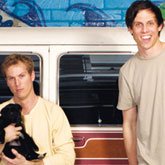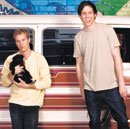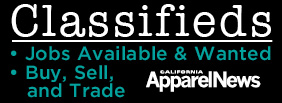Groceries: Making Organic Basics the Standard
Groceries Apparel co-founders Matthew Boelk and Rob Lohman, both 29, have high aspirations for their label, hoping it will become a leading branded basics supplier and private-label supplier of organic knits for specialty retailers.
“Our goal is to price stuff and compete not with other organic companies but with other conventional companies,” Lohman said.
“That’s one of our big ethos—to bridge the gap to be a price point,” Boelk said.
In 2011, the Groceries label used 100,000 yards of organic fabric and produced $1 million in goods that shipped to more than 200 doors worldwide, including Fred Segal stores in Los Angeles and Holt Renfrew in Canada. The two entrepreneurs project they will reach $4 million to $5 million in sales this year.
Wholesale price points for a basic crew-neck men’s pocket tee range from $10.50 to $16.50, depending on the fabric and order quantity, and $10 to $20 for fashion bodies.
“Basically, [we’re] sacrificing our margins to make organic the status quo and cause a shift in the organic-fabric industry and the demand for organic fabric,” Boelk said.
The co-founders examined elements from companies that they admired—the vertical production of American Apparel, the eco-friendly ethos and full transparency of production practices of Patagonia, and local sourcing by Whole Foods—and hope to employ them.
They source yarns from North Carolina, South Carolina, California and India. The rest of the production chain (knitting into fabric, cutting, sewing, garment dying and packaging) is done in their Los Angeles headquarters.
“We’ve developed a product, and the next day it’s in Planet Blue,” Boelk said.
The fit on the men’s basic crew necks features a lower-profile collar, slightly longer length and slim width. The women’s styles cover the key trends and fashion bodies such as racer-back tanks, cropped tees and slouchy V-necks. Each style is available in 100 percent organic cotton, organic cotton/recycled poly or a hemp/viscose blend.
Convert, a small specialty store in Berkeley, Calif., has been using Groceries since 2010 for its private-label shirts. The philosophy behind Convert is to promote products that use eco-friendly practices.
“[Basics is] something that I have to have in my store, and I’d rather do my own than carry [a branded collection], if I can,” Convert owner Randy Brewer said. “[Groceries is] what I’m all about—it’s organic; it’s made in the U.S.”
Brewer said he sold about 300 of the shirts in December. “We have guys who come back and buy four or five at a time after they buy one,” he said. “They wash well, they don’t lose their shape, and they’re sturdy.”
For Keyvan Behnia of the Nomads store in San Francisco, the flexible terms and large variety of colors, fabrics and bodies were huge incentives for him to replace his previous basics supplier with Groceries.
“I can have a private line that is a little bit wider than white, gray and black. … They have given me a lot of choice and no minimums,” Behnia said. He said his customer weighs the fashion, price and production practices equally when making a purchase.
“We tell everybody when they see our basics that it is organic cotton. That makes a big difference,” Behnia said.
The co-founders are betting that their simple business model of a quality product made by responsible methods will resonate with consumers. They plan to say on their website where the materials were sourced, how it was made, and the environmental pros and cons associated with some of the fabrics. For example, although hemp is a fast-growing plant that requires little water to grow, the process of converting the fiber into yarn is energy intensive.
“It’s the best [fiber] at achieving this feel, which is what retail wants. It’s a means to an end. I’m fully transparent with that,” Boelk said.
Lohman added, “We want to be open and show our processes to the public so they see where it’s made, how it’s made and by [whom]. We’re not taking advantage of anybody. Everybody here is an American working hard and making a fair wage.”—Rhea Cortado























